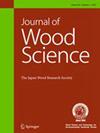通过对哥伦比亚亚马逊地区四种月桂科植物的化学分析勘探非木材林产品
IF 2.4
3区 农林科学
Q2 FORESTRY
引用次数: 0
摘要
月桂科(Lauraceae)是一个木本植物家族,具有重要的经济价值,主要用于木材和香料/食品的商业开发。然而,由于缺乏可持续发展战略和替代利用方式的知识,过度开发正导致其数量和相关生态系统的减少。本研究的重点是确定在哥伦比亚亚马逊地区(Departamento de Caquetá)的 Aniba panurensis、Nectandra cuspidata、Ocotea cymbarum 和 O. myriantha 的挥发性馏分/乙酸乙酯提取物中发现/鉴定的次生代谢物是否具有工业前景/意义,以便推荐木材以外的用途/开发。在这项工作中,通过 GC-FID/MS,对这些树木树干木材的挥发性馏分/总提取物(通过 HS-SPME/SDE/浸渍法)的化学成分进行了测定。结果如下(i) A. panurensis 的挥发性馏分/萃取物由 88-94% 的苯类芳香酯(水杨酸苄酯和苯甲酸苄酯)组成;(ii) N. cuspidata 的挥发性馏分/萃取物由 95% 的芝麻酯(水杨酸苄酯和苯甲酸苄酯)组成。(ii) N. cuspidata 含有 95% 的倍半萜类化合物(α-罂粟碱和 α-古柯烯/月桂烯 D)(HS-SPME),89% 的含氧和烃化倍半萜类化合物(τ-cadinol 和 δ-cadinene)(SDE),87% 的倍半萜类化合物和卟吩生物碱(α-罂粟碱/月桂烯 D/δ-cadinene/α-cubebene 和双缩戊烯/脱氢双缩戊烯)(溶剂萃取);(iii) O.(iii) 用 HS-SPME 法提取的 O. cymbarum 主要含有 63%的倍半萜和单萜醚(α-槐 烯/反式菖蒲烯和桉叶油醇),用 SDE/溶剂萃取法提取的单萜醇(α-松油醇/ 松油醇)/烃(α-/β-蒎烯)/醚(桉叶油醇)和苯丙醚(甲基丁香酚);以及 (iv) 用 SPME 法提取的 O. myriantha,其每个科的成分含量为 0.5%。myriantha,每个科的成分为:91%倍半萜类(双环割棉烯/割棉烯 D)-HS-SPME,72%倍半萜醇和倍半萜类/单萜烯类(鞘氨醇和双环割棉烯/δ-3-蒈烯)-SDE、和 69% 的类苯类芳香酯和倍半萜烃/醇(水杨酸苄酯和双环马可烯/α-蒈烯醇)-溶剂萃取。总之,从这些物种的木材(挥发性馏分/萃取物)中鉴定出的主要成分,由于其生物特性和芳香特性,可以分离出来并进行可持续利用/开发,其中一些成分可被不同行业/类型的产业所利用。本文章由计算机程序翻译,如有差异,请以英文原文为准。
Prospecting for non-timber forest products by chemical analysis of four species of Lauraceae from the Amazon region of Colombia
Lauraceae is a family of woody plants of economic importance mainly for their commercial exploitation as timber, as well as spices/food. Nonetheless, overexploitation is causing a decline in both the population and the associated ecosystems due to the lack of sustainability strategies and knowledge of alternative ways of utilization. The focus of this research was to determine if the secondary metabolites found/identified in the volatile fractions/ethyl acetate extracts of Aniba panurensis, Nectandra cuspidata, Ocotea cymbarum and O. myriantha from the Amazon region of Colombia (Departamento de Caquetá) would be promising/interesting for industry, so that uses/exploitation other than timber could be recommended. In this work, the chemical compositions by GC–FID/MS of the volatile fractions/total extracts (by HS–SPME/SDE/maceration) of the trunk wood of these trees were determined. The results were: (i) the volatile fractions/extracts of A. panurensis were composed of 88–94% benzenoid-type aromatic esters (benzyl salicylate and benzoate); (ii) N. cuspidata contained 95% sesquiterpenes (α-copaene and α-cubebene/germacrene D) by HS–SPME, 89% oxygenated and hydrocarbonated sesquiterpenes (τ-cadinol and δ-cadinene) by SDE, and 87% sesquiterpenes and aporphine alkaloids (α-copaene/germacrene D/δ-cadinene/α-cubebene and dicentrine/dehydrodicentrine) by solvent extraction; (iii) O. cymbarum contained mainly 63% sesquiterpenes and monoterpene ethers (α-copaene/trans-calamenene and eucalyptol) by HS–SPME, 63–85% of monoterpene alcohols (α-terpineol/borneol)/hydrocarbons (α-/β-pinenes)/ethers (eucalyptol) and phenylpropanoid ethers (methyleugenol) by SDE/solvent extraction; and (iv) for O. myriantha, the constituents per family were 91% sesquiterpenes (bicyclogermacrene/germacrene D)—HS–SPME, 72% sesquiterpene alcohols and sesquiterpenes/monoterpenes (spathulenol and bicyclogermacrene/δ-3-carene)—SDE, and 69% benzenoid-type aromatic esters and sesquiterpene hydrocarbons/alcohols (benzyl salicylate and bicyclogermacrene/α-cadinol)—solvent extraction. In conclusion, the main constituents identified in the woods (volatile fractions/extracts) of the species could be isolated and sustainably used/exploitated due to their bioproperties, as well as for their fragrant properties, some of which could be harnessed by different sectors/types of industries.
求助全文
通过发布文献求助,成功后即可免费获取论文全文。
去求助
来源期刊

Journal of Wood Science
工程技术-材料科学:纸与木材
CiteScore
5.40
自引率
10.30%
发文量
57
审稿时长
6 months
期刊介绍:
The Journal of Wood Science is the official journal of the Japan Wood Research Society. This journal provides an international forum for the exchange of knowledge and the discussion of current issues in wood and its utilization. The journal publishes original articles on basic and applied research dealing with the science, technology, and engineering of wood, wood components, wood and wood-based products, and wood constructions. Articles concerned with pulp and paper, fiber resources from non-woody plants, wood-inhabiting insects and fungi, wood biomass, and environmental and ecological issues in forest products are also included. In addition to original articles, the journal publishes review articles on selected topics concerning wood science and related fields. The editors welcome the submission of manuscripts from any country.
 求助内容:
求助内容: 应助结果提醒方式:
应助结果提醒方式:


